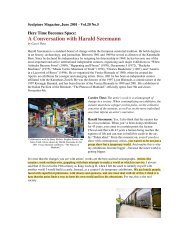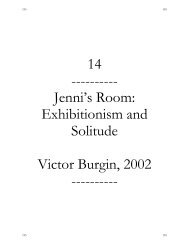Untitled
Untitled
Untitled
You also want an ePaper? Increase the reach of your titles
YUMPU automatically turns print PDFs into web optimized ePapers that Google loves.
Hitler’s Art Theory<br />
This is why Hitler declared that the liberation of art from its imprisonment<br />
by an art criticism that argues in terms of pure theory would be the<br />
main task of his policies on art—and he was committed to pursuing this battle<br />
for liberation as ruthlessly as possible. He wanted to produce instead a heroic<br />
art that possessed eternal value. One could admittedly say that this constant<br />
emphasis on art’s eternal value was mere talk, merely rhetorical flourishes<br />
meant to justify the regime’s atrocities. That view loses plausibility, however,<br />
when one notes that Hitler used the same arguments to move the members<br />
of his own party to sacrifice their immediate political goals in order to create<br />
art that would have eternal value, asking them: “Can we allow ourselves to<br />
sacrifice for art at a time when there is so much poverty, want, misery, and<br />
despair everywhere around us” 4 The answer, of course, is “Yes, we can and<br />
should”—and therefore Hitler denounced the lack of appreciation for art by<br />
those members of the National Socialist Party who were not willing to mobilize<br />
the means and forces of the Third Reich not just for the economy and<br />
the army but for art as well. Because, so Hitler argued, the Third Reich could<br />
exist eternally only if it were to produce art that possessed eternal value. And<br />
there is no doubt that Hitler saw the perspective of eternity alone as a State’s<br />
ultimate justification. Hence the production of art with eternal value was the<br />
ultimate task of politics if politics hoped to pass the crucial test—the test of<br />
eternity. The concept of eternity was thus the core of Hitler’s reflections on<br />
heroic art—on art as a heroic act. The heroic was nothing other than a willingness<br />
to live for eternal fame and to exist in eternity. The heroic act was<br />
defined by its transcendence of immediate, temporal goals and was an eternal<br />
role model for all time to come. Given its centrality and influence, it makes<br />
sense for us to look at this concept of eternity in detail.<br />
First of all, Hitler never spoke of eternity in the sense of the immortality<br />
of the individual soul. The eternity of which Hitler spoke was a post-Christian<br />
one, a thoroughly modern one in that it was a purely material, corporeal<br />
eternity—an eternity of ruins, of the relics left behind by any civilization once<br />
it has gone under. These material remains that outlast every civilization could<br />
produce in later observers either fascination, astonishment, at the recognition<br />
of the traces of a heroic, artistic, creative act, or simply tired disinterest. Thus<br />
Hitler understood the eternal value of art as the impression that art makes<br />
on a future observer. And it was this gaze of the future observer that Hitler<br />
sought to please first and foremost—and from it Hitler expected to receive







